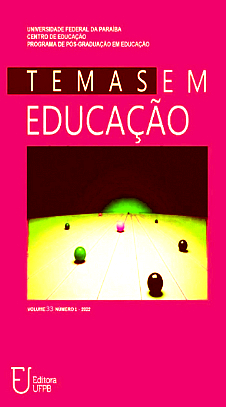Para ter Funk (na escola) é preciso dançar:
problemas e desafios para a Educação Matemática
DOI:
https://doi.org/10.22478/ufpb.2359-7003.2024v33n1.68630Keywords:
Mathematics, Mathematics Education, Truth, Knowledge production, FunkAbstract
Dancing to the rhythm of funk, we present in this article some reflections sewn by the margins of the radiographs that science has made of the peripheries and the coloniality of knowledge operationalized to keep other knowledge from the school curricula aside. Guided by the philosophy of difference in dialogue with the demands that arise from young people on the periphery, we raise the question of the truth built by/with Mathematics to deconstruct the colonial lenses that erase the voices, bodies and knowledge of men and women who inhabit the peripheral space. Finally, it is written to provoke an initial spark in the discussion about the knowledge production process of Mathematics (Education) as a field of research, used in the constitution of a curriculum, a curriculum that dialogues with the demands of young people from urban peripheries.
Downloads
References
BARATA, Carlos Eduardo; BUENO, Antonio Henrique da Cunha. Dicionário das famílias brasileiras. V. 01 e 02. São Paulo: Ibero América, 1999.
DAYRELL, Juarez. O rap e o funk na socialização da juventude. Educação e pesquisa, v. 28, p. 117-136, 2002.
DELEUZE, Gilles. A lógica do sentido. Tradução de Luiz Roberto Salinas Fortes. São Paulo: Perspectiva, 2015.
DE SÁ, S. P. Funk carioca: música eletrônica popular brasileira?!. E-Compós, [S. l.], v. 10, 2007. DOI: 10.30962/ec.195. Disponível em: https://www.e-compos.org.br/e-compos/article/view/195. Acesso em: 4 jul. 2022.
DESPENTES, Virgine. Teoria King Kong. São Paulo: N-1 Edições, 2016.
FILHO, Aldo Victorio. Estéticas nômades: outras histórias, outras estéticas, outros... ou o funk carioca: produção estética, epistemológica e acontecimento. Visualidades, v. 6, n. 1, p. 215-229, 2008.
GUÉRIOS, Rosário Farâni Mansur. Dicionário etimológico de nomes e sobrenomes. 2 ed. São Paulo: Ave Maria, 1973.
HERSCHMANN, Micael. O Funk e o Hip-Hop Invadem a cena. Rio de Janeiro: UFRJ, 2000.
FOUCAULT, Michel. Microfísica do poder. Rio de Janeiro: Edições Graal, 2003.
GUATTARI, Félix; ROLNIK, Suely. Cartografias do Desejo. Petrópolis: Ed. Vozes, 2010.
LANDER, Edgardo (org.). A colonialidade do saber: eurocentrismo e ciências sociais. Perspectivas latino- americanas. Colección Sur Sur. Ciudad Autónoma de Buenos Aires, Argentina: CLACSO, 2005.
NEGRI, Antonio e HARDT, Michael. Declaração: Isto Não é um Manifesto. São Paulo: Ed. Sesc/N-1, 2014.
NIETZSCHE, Friedrich. Assim falava Zaratustra. Tradução de José Mendes de Souza. EBooksBrasil, 2002. Disponível em <http://www.ebooksbrasil.org/eLibris/zara.html>. Acesso em 03 jul. 2022.
PERALVA, Angeline. O Jovem como Modelo Cultural. Faculdade de Educação, Universidade de São Paulo. Juventude e Contemporaneidade. – Brasília : UNESCO, MEC, ANPEd, 2007. 284 p. – (Coleção Educação para Todos; 16).
PIRES, João Augusto Neves. Cultura funk e subjetividades consumistas: sensibilidades da juventude no fluxo das periferias brasileiras (1990-2014). 200f. Dissertação (mestrado) - Universidade Federal de Uberlândia, Programa de Pós-Graduação em História, 2015.
RANCIÈRE, Jacques. A estética como política. Revista Devires. Belo Horizonte, v.7, n.2, p.14-36, Jul/Dez. 2010.
ROLNIK, Suely. Esferas da insurreição: notas para uma vida não cafetinada. n-1 edições, 2019.
SAID, Edward Wadie. Representações do intelectual: as conferências Reith de 1993. Editora Companhia das Letras, 2005.
SOUZA, Herbert. Democracia. In CLÍMACO, C.de S., ESTEVES, J. A. de L. e COUTINHO, L. M. (orgs.). Pensamento Inquieto. Brasília: Editora da Universidade de Brasília, 1993, p. 143-54.
SPOTIFY. Culture Next. Disponível em: https://culturenext.byspotify.com/pt-BR.
VEIGA-NETO, Alfredo; LOPES, Maura Corcini. A inclusão como dominação do outro pelo mesmo. Pedagogia e saberes, Bogotá, n. 36, p.57-68, 2012. Disponível em: https://revistas.pedagogica.edu.co/index.php/PYS/article/view/1806/1776.
WALLERSTEIN, Immanuel. Capitalismo histórico e civilização capitalista. Rio de Janeiro: Contraponto, 2001.
Downloads
Published
How to Cite
Issue
Section
License
Copyright (c) 2024 Revista Temas em Educação

This work is licensed under a Creative Commons Attribution 4.0 International License.
Authors who publish in this journal agree to the following terms:
. Authors retain the copyright and grant the journal the right to first publication, with the work simultaneously licensed under the Licença Creative Commons Attribution that allows the sharing of the work with acknowledgment of authorship and initial publication in this magazine. . Authors are authorized to assume additional contracts separately, for non-exclusive distribution of the version of the work published in this journal (eg, publishing in institutional repository or as a book chapter), with acknowledgment of authorship and initial publication in this journal.
. Authors are permitted and encouraged to publish and distribute their work online (eg in institutional repositories or on their personal page) at any point before or during the editorial process, as this can generate productive changes, as well as increase impact and citation of the published work (See O Efeito do Acesso Livre).



















